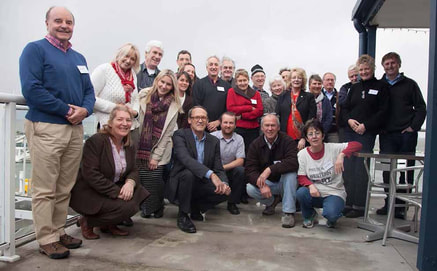 In 2014 75 participants from 40 organisations gathered on Phillip Island to develop a visionary manifesto for the future of Western Port.
In 2014 75 participants from 40 organisations gathered on Phillip Island to develop a visionary manifesto for the future of Western Port. Photo: Natalie Davey, courtesy of VNPA
When it comes to Western Port, the story of Robert the Bruce comes to mind as he watched the spider trying to spin its web. It eventually succeeded and Robert taking heart from this returned to the battle and eventually overcame the English.
In this scenario, the English are our politicians.
Throughout the long Western Port campaign spanning some 50 years, the community has faced one battle after another.
For example, the current Save the Western Port Woodlands conflict has escalated, but so far the politicians still hold the high ground and are not likely to yield or seek a peaceful resolution. This is an unfortunate situation and now lawyers have been engaged to argue over what could be considered a “Rights of Nature” case.
Over five days on Phillip Island, 75 participants from 40 organisations developed possible scenarios for Western Port. The workshop was held at Newhaven Yacht Club so participants only had to look out the windows to be reminded of what was at stake.
It was organised by researchers from ANU, local action group Preserve Western Port and the Victorian National Parks Association, with the support of the Bass Coast Shire Council. Participants included world-leading futurist Robert Costanza, ecological economists, academics, key regional decision makers and community group representatives who worked together to develop ideas for the future of Western Port.
Their conclusions and recommendation were visionary, but their call to the government to use the final report for a broader investigation of sustainable futures for the Western Port Region has gone unheeded.
I believe it’s time for a second planning workshop, this one to be titled “Western Port Country – a new beginning”, with the outcome to be presented as a parliamentary petition.
There are certain givens: land, sea and waterways are interdependent; adapting to climate change is imperative; the current economic model’s reliance on depleting the world’s dwindling natural resources cannot be sustained; and the world’s ecosystems are in decline.
To kick things off, here are my suggestions for agenda items.
- The Andrews government to legislate a Western Port Region Strategic Management Plan (WPRSMP) by October 2023.
- Melbourne Water to oversee the WPRSMP on behalf of the state government.
- Extend the UNESCO Western Port Biosphere Reserve to encompass a greater proportion of the Western Port catchment area.
- Declare the Western Port region a Distinctive Areas and Landscapes entity.
- Amalgamate the four councils bordering Western Port to administer the Western Port region in association with Melbourne Water.
- Given French Island’s unique situation within the Western Port Biosphere Reserve, enable its community to participate in developing the WPRSMP.
- Following on from the 2014 scenario planning workshop, initiate a regional business plan based on a carbon-neutral, nature-based, circular economy capable of producing and sustaining regenerative and ecologically friendly non-toxic produce, goods and services.
- In line with the “Rights of Nature” laws enshrined in a WPRSMP, prohibit human activity that interferes with the ability and rights of ecosystems to exist and flourish.
- Change urban and rural planning laws to curtail commercial developers and others undertaking projects that do not give primacy to social equity, Green Wedge status and preserving ecological sustainability.
- Ensure the newly created national environment protection agency assesses all environmental and planning issues associated with the proposal to use the Port of Hastings to support offshore wind construction needs and any further port development.
- Through the TAFE network, provide skills-based training programs to ensure a highly skilled workforce is in place to achieve the circular economy objectives.
- Embrace Aboriginal approaches to caring for Country to guarantee the region’s biodiversity is nurtured and preserved and becomes an integral part of the circular economy.